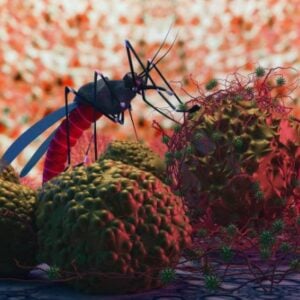Artemisinin-based combination therapies (ACTs) have been the primary treatment for malaria since 2001, but rising resistance to artemisinin now threatens decades of hard-won progress against the disease, which claimed more than 600,000 lives in 2024. Recent studies have confirmed partial resistance in several regions of Africa. Although resistance to the ACT partner drugs has not yet been fully established, there are warning signs, and the reduced efficacy of these frontline treatments could put millions of lives at risk—particularly those of young children and pregnant women.
Africa’s heavy reliance on artemether-lumefantrine, which represents over 80% of malaria treatments used on the continent, further increases vulnerability to resistance and its devastating consequences. To confront this growing threat, Unitaid and Jhpiego have launched the Scaling the Optimal Use of Multiple ACTs to Prevent Antimalarial Drug Resistance (STOP-AMDR) initiative, a US$26.5 million program aimed at safeguarding the effectiveness of existing treatments. The project promotes the introduction and scale-up of multiple first-line therapies, using two or more ACTs either in rotation or simultaneously within populations, to slow the spread of resistance and preserve treatment efficacy.
This four-year initiative will operate in six countries—Burkina Faso, the Democratic Republic of Congo, Kenya, Nigeria, Rwanda and Uganda—working closely with global health partners, national malaria programmes, civil society, and communities. According to Unitaid’s Executive Director, Dr. Philippe Duneton, drug resistance is one of the most serious threats to malaria control in Africa, and STOP-AMDR will play a key role in protecting lives, preserving essential treatments, and strengthening resilience against future health threats.
With no new non-artemisinin therapies expected before 2027, urgent action is required. STOP-AMDR will strengthen supply chains, prepare health systems for rollout, engage communities to support treatment uptake, and help governments establish national frameworks to sustain the approach over the long term. Dr. Aimable Mbituyumuremyi of Rwanda’s Ministry of Health emphasized that, unlike in the past when drug resistance devastated communities, this partnership is advancing strategies that will safeguard health for generations to come.
Failure to act, according to Imperial College London, could result in up to 16 million additional malaria cases, 80,000 more deaths, and an annual economic burden of US$1 billion. By supporting innovation, reinforcing health systems, and ensuring community protection, Unitaid, Jhpiego, and national governments are working to turn the tide against malaria and drug resistance—saving lives today and building a healthier, more prosperous future.







